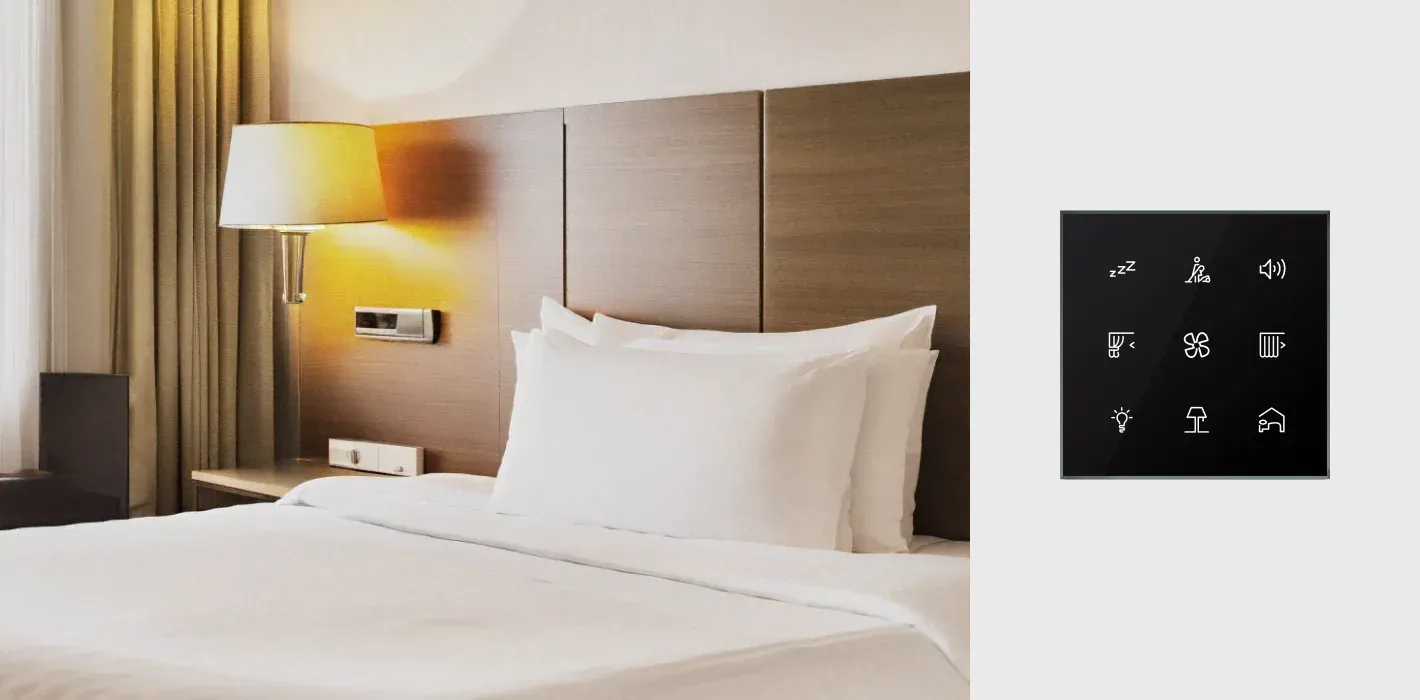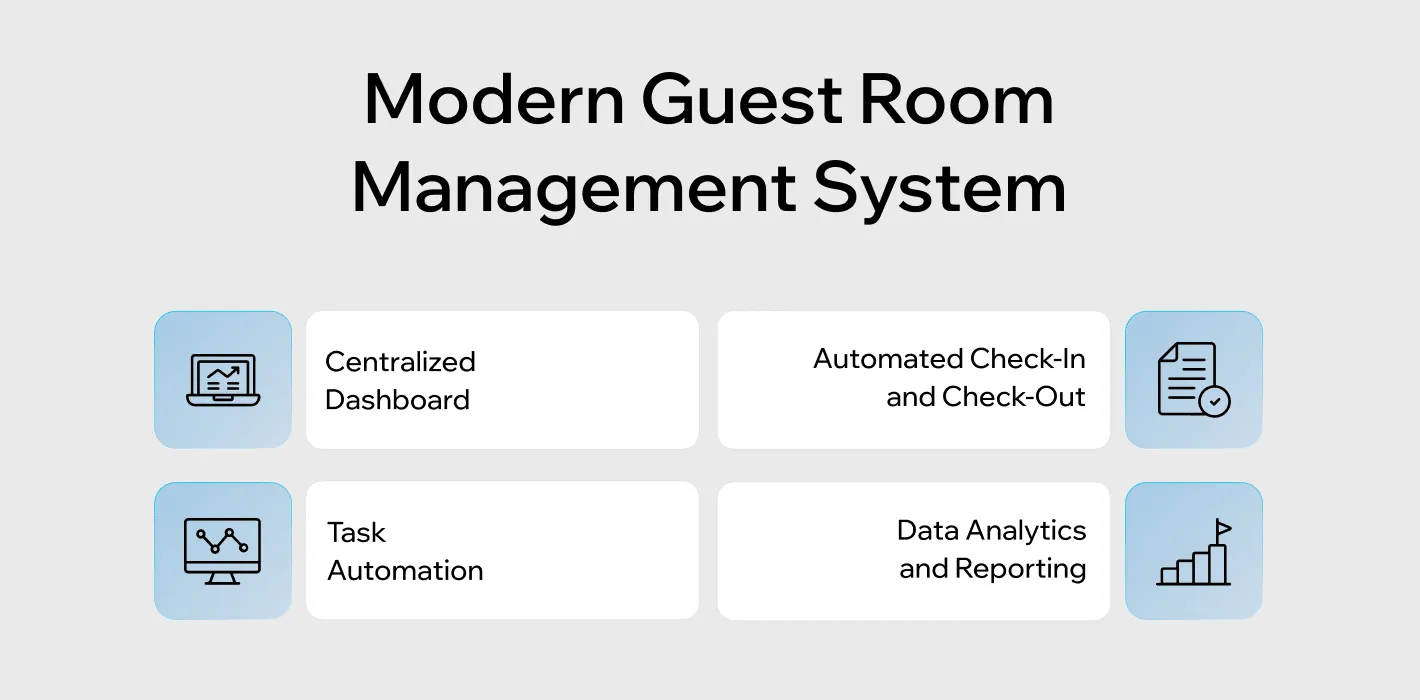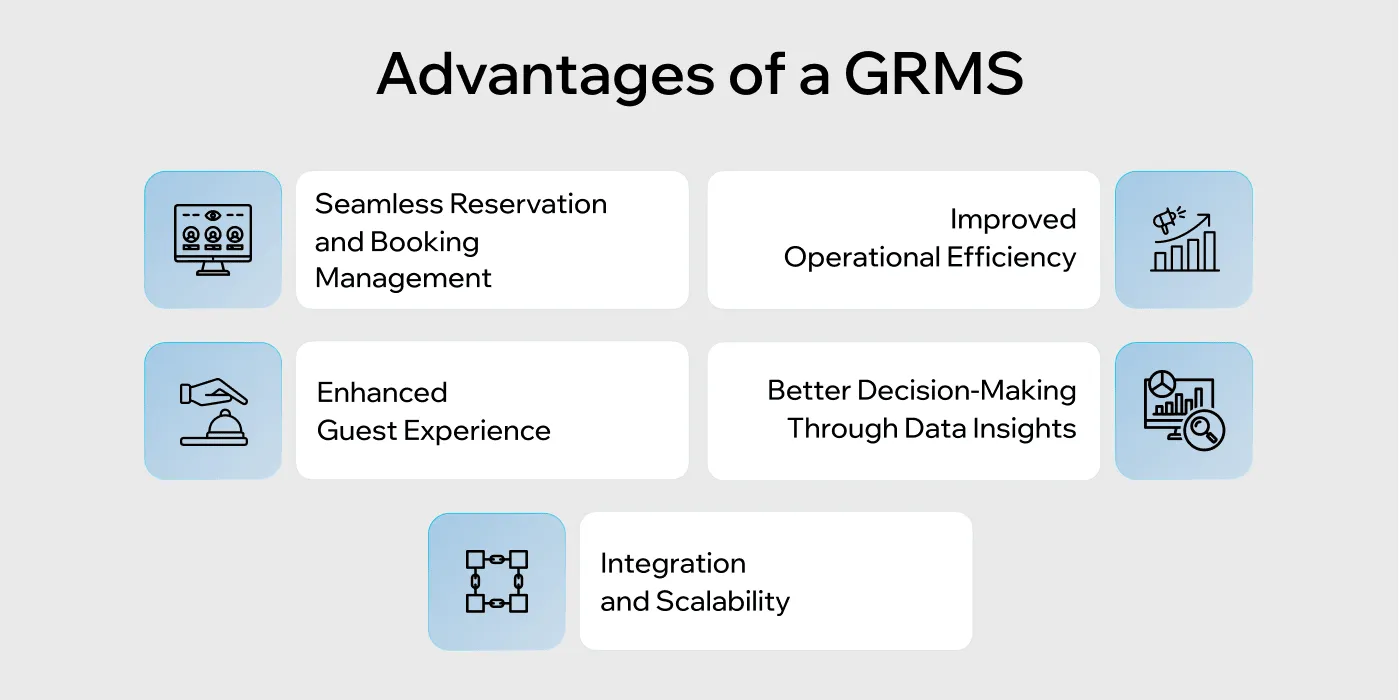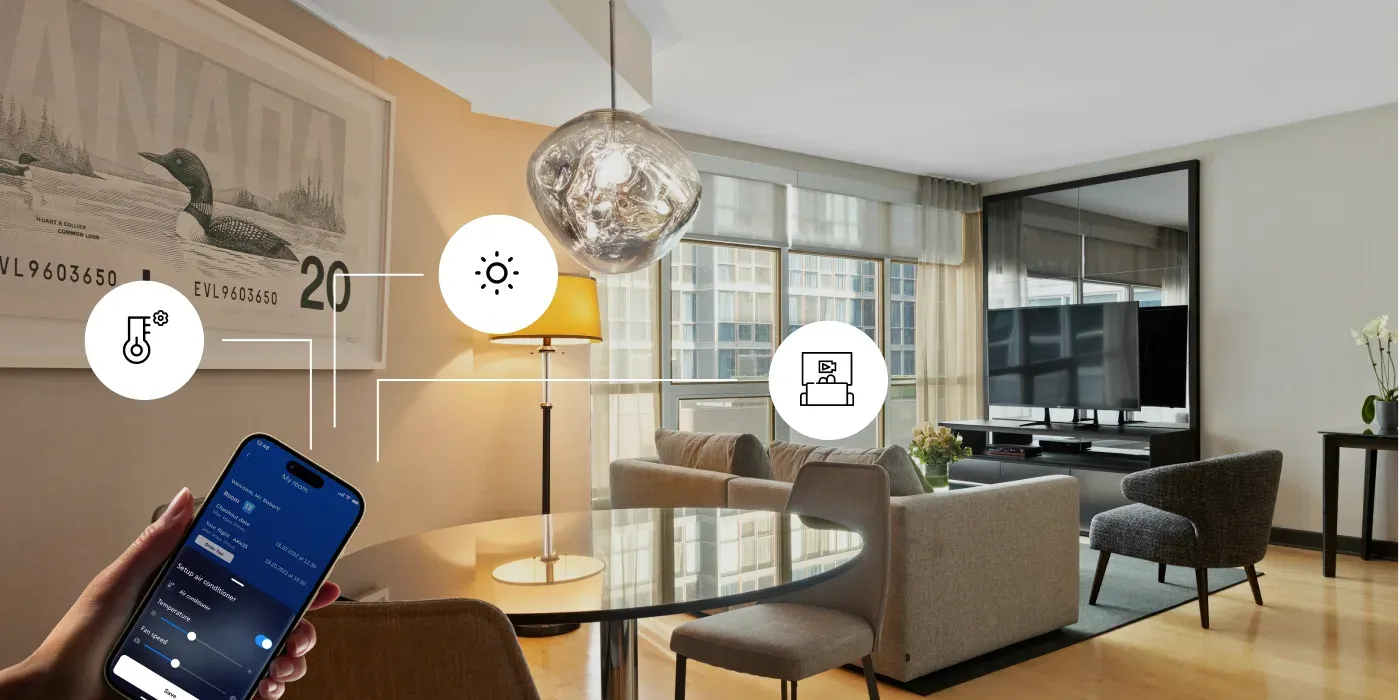

Imagine managing guest rooms from one centralized system that gathers guest data, offers control and regulation options, and helps make informed decisions.
Believe it or not, there is a system that can make all of these possible. It is called a guest room management system (GRMS).
GRMS is a game-changer for hotels looking to streamline their operations and improve the guest experience.
This system integrates various aspects of room management—from lighting and temperature controls to task automation and in-room entertainment. The result? Seamless operations, happier guests, and ultimately, increased income generation.
If you want to optimize your hotel operations with a guest room management system, keep reading this article.

Key Takeaways
A guest room management system (GRMS) is an all-in-one solution that allows hotels to automate and manage certain in-room activities. A GRMS makes it easier to deliver an exceptional guest experience and run hotel operations smoothly.
Usually accessible via a centralized interface, the system comprises elements such as:
This setup allows guests to personalize their room environment according to their preferences, making for a more comfortable and enjoyable stay.
For hotel staff, a guest room management system offers the convenience of remotely monitoring and adjusting room settings, boosting operational efficiency and energy savings.
Plus, it integrates effortlessly with the hotel’s property management system (PMS), making check-ins, room assignments, and service requests a breeze.
 Are you thinking about upgrading your hotel with a modern GRMS? Here are four key features of a modern room management system worth considering:
Are you thinking about upgrading your hotel with a modern GRMS? Here are four key features of a modern room management system worth considering:
An efficient guest room management system relies on a single, easy-to-use dashboard.
With complete data on every room, you can monitor and adjust room statuses in real time. This function is vital because it brings essential information together in one place.
With a glance, you can quickly identify which rooms need cleaning, which are occupied, and which are available. This real-time visibility ensures that nothing is overlooked, helping to streamline daily operations.
A hotel guest management system with a well-designed dashboard should be user-friendly, with seamless and straightforward access to key information. It should also allow you to customize the interface to suit your needs.
Let’s say you want to evaluate particular metrics, like occupancy rates or upcoming check-ins. With a robust centralized dashboard, you can get such data quickly and easily.
This degree of customization empowers you to manage your operations more efficiently and can help inform your business and marketing strategies.
Automated check-in and check-out systems can significantly boost guest satisfaction by streamlining the process and reducing wait times.
In fact, a 2024 survey by Mews found that almost 80% of travelers are happy with automated front desk or self-service options, and over 40% prefer to check in online via a hotel’s app, website, or digital kiosk.
So, when choosing a guest room management system, look for features like online or self-service check-in. These options offer guests more flexibility and convenience.
Equally crucial is automated checkout. With a GRMS, guests can settle their bills and complete the check-out process without hassle. These systems are great at quickly updating room statuses, processing payments, and sending final bills via email. This improves the guest experience and frees staff to focus on other critical tasks.
Task automation is a game-changer for improving hotel operations. By automating routine tasks like housekeeping and maintenance requests, you can instantly boost the efficiency of your operations.
Quick room cleaning and timely maintenance are key to delivering a top-notch guest experience. Hotel room management software with automated task assignments makes this easier to achieve.
GRMS can generate daily cleaning schedules for housekeeping staff based on current room occupancy and upcoming check-ins. This gives your team the tools to assign tasks, track progress, and update room statuses quickly and efficiently.
Additionally, a GRMS can log maintenance requests, prioritize them by urgency rate, and assign them to the appropriate staff members. Automating these processes helps ensure that staff workloads are managed effectively and that your property is always in excellent condition.
Understanding your hotel's operation is key to making smarter, more strategic business decisions. A guest room management system should provide robust data analytics that allow you to track critical performance metrics like:
| Metric | Description | Used For |
|---|---|---|
| Occupancy Rates | Measures the percentage of rooms occupied over a specific period. | Adjusting marketing strategies and pricing according to demand. |
| Average Daily Rate (ADR) | Calculates the average revenue earned per occupied room. | Understanding pricing effectiveness and revenue performance. |
| Revenue Per Available Room (RevPAR) | Evaluates total room revenue divided by the number of available rooms. | Assessing both occupancy and rate efficiency for revenue optimization. |
| Guest Satisfaction Ratings | Collected feedback from post-stay surveys. | Identifying areas for improvement and enhancing guest experience. |
| Housekeeping Efficiency | Tracks the time taken to clean and prepare rooms for new guests. | Optimizing housekeeping operations and ensuring timely room turnover. |
| Maintenance Response Time | Measures the time taken to respond to and resolve maintenance requests. | Ensuring property upkeep and maintaining guest satisfaction. |
| Energy Usage | Monitors energy consumption per room. | Identifying cost-saving opportunities and sustainability initiatives. |
| Booking Source Analysis | Identifies which booking channels are most effective. | Optimizing marketing spend and improving booking strategy. |
| Guest Preferences and Behavior | Tracks guest preferences for room types, amenities, and services. | Enhancing personalization and improving guest experience. |
| Check-In/Check-Out Efficiency | Measures the average time taken for guests to check in and out. | Improving operational flow and guest satisfaction. |
| Revenue Breakdown by Room Type | Analyzes the revenue generated by different room types. | Understanding profitability and optimizing pricing strategies. |
| Cancellations and No-Show Rates | Tracks the frequency of cancellations and no-shows. | Refining reservation policies and minimizing revenue loss. |
| Upsell and Cross-Sell Performance | Monitors the effectiveness of upselling and cross-selling efforts. | Maximizing revenue through additional services and room upgrades. |
| Guest Loyalty and Retention Rates | Measures repeat guest rates. | Assessing the success of loyalty programs and guest retention strategies. |
Additionally, a powerful guest room management system can help identify patterns in guest behavior, such as preferences for certain room types or amenities, by analyzing trends over time.
You can tailor your offerings and improve your personalized marketing efforts with such information. This ultimately drives higher guest loyalty and increases repeat bookings.
 A guest room management system can bring multiple advantages to your hotel. Here are five of the primary benefits:
A guest room management system can bring multiple advantages to your hotel. Here are five of the primary benefits:
GRMS improves the reservation and booking process. Real-time updates on room availability minimize the risk of overbooking, making it easier for staff and guests to adjust bookings as needed.
Plus, the booking process is often a guest's first interaction with your hotel. That’s why having a smooth, user-friendly hotel room management system creates a great first impression and sets the tone for a positive stay.
Smooth operations are the backbone of any successful hotel, and a modern guest room management system plays a key role in achieving this. GRMS can drastically reduce time-consuming manual processes by automating repetitive tasks like scheduling and centralizing key functions like in-room controls.
A GRMS can also streamline internal communications. A unified platform where staff can instantly share updates, requests, or issues improves collaboration and teamwork. This reduces the chance of miscommunication and helps coordinate efforts across departments more effectively.
When staff are less burdened by administrative tasks, they can devote more attention to delivering personalized, high-quality guest experiences.
Delivering an exceptional guest experience is at the heart of the hospitality industry.
With hotel occupancy predicted to increase by 2.5% globally and the average daily rate (ADR) projected to grow by 4.9% over the next 12 months, the stakes have never been higher for delivering memorable stays.
A guest room management system is essential in meeting these growing expectations. It offers various smart features, such as mobile check-in and check-out, and in-room controls for lighting and temperature.
A GRMS also provides personalized service options catering to guests' unique preferences, raising the bar for high-quality experiences. These capabilities add a personal touch that can set your hotel apart from the competition.
Moreover, a GRMS can facilitate real-time communication between guests and staff, allowing for quick responses to any requests or concerns. This level of attentiveness skyrockets guest satisfaction and fosters loyalty. Ultimately, guests are more likely to return to a hotel where they feel genuinely cared for.
A modern guest room management system is designed to grow your business. It easily integrates with various platforms, such as CRM systems, Booking.com, Airbnb, and other booking sites, for seamless data flow across all channels.
Integrations provide a solid operational foundation that can adapt and scale with your hotel’s changing needs. Staying competitive in the hospitality industry requires embracing new technologies and market trends, and a scalable GRMS helps you do just that.
Robust hotel room management software offers valuable data insights to help you make informed business and operational decisions. You can identify trends and areas for improvement by tracking key performance metrics.
These insights enable you to adjust strategies, optimize pricing, and enhance marketing efforts, ultimately leading to better financial performance and a more decisive competitive edge.
As the “Bleisure” market continues to rise, with business trips frequently extended for leisure purposes, a GRMS becomes even more valuable.
According to Future Market Insights, the Bleisure tourism market is currently worth $709.2 billion. This figure is predicted to grow to $4,219.5 billion by 2034 at a compound annual growth rate (CAGR) of 19.5%.
With more guests blending work and leisure during their stays, the ability to provide a customized experience tailored to both business and relaxation needs is crucial. A hotel guest management system can help you tap into this trend by gathering and analyzing data on guest preferences and behaviors. With these practical insights, you can offer personalized amenities and services that make your guests’ stay unique.
By connecting smart TVs to the GRMS, guests can control their entire environment from one interface, alongside other in-room amenities like lighting, temperature, and curtains.
A smart TV management platform eliminates the need for on-site technical assistance, allowing remote upgrades and troubleshooting. Moreover, a GRMS can automatically adjust or power off the TV when the room is unoccupied. Hello, energy savings!
This integration offers guests a diverse range of TV content options, including satellite, air, or cable networks channels, and a rich library of movies and shows on-demand. For added personalization, a robust smart TV solution can select the guest’s preferred language, ensuring a welcoming and comfortable experience right from the start.
 Administrators can easily send personalized messages, set wake-up alarms, or even share real-time weather and flight information—keeping guests informed and engaged throughout their stay. Plus, smart TVs can be used as a marketing tool with customized advertising channels that promote hotel amenities, local attractions, or special offers.
Administrators can easily send personalized messages, set wake-up alarms, or even share real-time weather and flight information—keeping guests informed and engaged throughout their stay. Plus, smart TVs can be used as a marketing tool with customized advertising channels that promote hotel amenities, local attractions, or special offers.
That’s not all, though. A smart TV guest room management system can streamline billing processes and support in-room ordering from a catalog of goods and services. These features enhance convenience and open up additional revenue streams for your hotel.
If these features and benefits sound good, then you’re in luck. Integrating a smart TV solution with your guest room management system is one step away from you.
With HotelSmarters, you can get an all-in-one, cost-effective, and customized solution that aligns with both your hotel’s needs and your guests' preferences.
It’s as easy as booking your free demo.
While implementing a guest room management system (GRMS) offers numerous advantages, you need to be aware of several challenges and considerations to ensure a smooth and effective rollout:
Compatibility issues may arise when connecting a new GRMS with existing HVAC, lighting controls, and property management systems (PMS), requiring significant upgrades or customization.
Solution
Ensure thorough system compatibility checks before implementation. Work with vendors that offer flexible APIs and integration support. Plan phased upgrades if needed to minimize service disruptions.
Implementation costs include hardware, software, and installation, as well as ongoing expenses like maintenance, system upgrades, and repairs. These costs can be steep, especially for smaller hotels.
Solution
Conduct a cost-benefit analysis to determine ROI. To reduce upfront expenses, consider financing options, phased implementations, or cloud-based solutions. Prioritize long-term savings through energy efficiency and operational improvements.
Your staff may require thorough training to use the GRMS effectively. A steep learning curve could lead to inefficiencies if employees do not fully understand the system’s features.
Solution
Implement a structured training program with hands-on sessions. Provide easy-to-follow manuals or digital guides. Encourage guest-friendly interfaces and automation to minimize reliance on staff.
GRMS systems collect and manage guest data to personalize experiences, raising concerns about privacy and security risks.
Solution
Perform strong cybersecurity measures, including encryption and access controls. Ensure compliance with data protection regulations. Regularly update security protocols and educate staff on data protection best practices.
Investing in a guest room management system can significantly enhance guest satisfaction and streamline hotel operations. A modern GRMS boosts energy efficiency, optimizes service delivery, and provides guests with a seamless, personalized experience by automating and integrating various in-room functions.
While there are challenges to consider—such as costs, integration complexities, and system reliability—a GRMS is an essential tool for modernizing hotel operations and staying competitive in an ever-evolving industry.
Ready to elevate your hotel with cutting-edge technology? If you’re looking for a smart TV solution that seamlessly integrates with your GRMS, HotelSmarters has you covered.
Partner with us today to create a customized solution that meets both your hotel’s needs and your guests’ preferences. Let’s work together to enhance your guest experience and drive your hotel’s success!
A GRMS (Guest Room Management System) is a smart control system used in hotels to manage in-room features like lighting, temperature, curtains, and energy usage.
It allows guests to personalize their environment and helps hotels improve energy efficiency and service automation. GRMS often integrates with keycards, sensors, and mobile apps for seamless control and comfort.
The cost of a guest room management system depends on elements such as hotel size, system complexity, and customization. Usually, the first outlay for each room runs from a few thousand to tens of thousands of dollars, plus further continuous expenses for maintenance and upgrades.
While the initial costs of implementing GRMS may be higher, smaller hotels can benefit from long-term savings through increased energy efficiency, improved operations, and enhanced guest experiences. Careful consideration of ROI and scalability can make GRMS a viable investment, even for smaller properties. That said, a hotel middleware solution may be a more affordable option.
A GRMS helps increase energy efficiency by automating the regulation of lighting, HVAC systems, and other energy-consuming equipment depending on room occupancy. The system can, for example, turn off lights or change the temperature when a room is empty, minimizing pointless energy consumption.
A hotel energy management system (EMS) is a technology solution designed to optimize and control energy usage within a hotel. It integrates various systems, such as heating, ventilation, air conditioning (HVAC), lighting, and in-room electronics. A guest room energy management system ensures energy is used efficiently without compromising guest comfort.
A hotel room management system needs continuous support and maintenance to guarantee the best performance following installation. This covers sporadic hardware inspections, system monitoring, and software upgrades.
Yes, GRMS can integrate with various hotel systems, such as property management systems (PMS), HVAC controls, and even external booking platforms like Airbnb or Booking.com. This integration helps streamline operations across multiple platforms and ensures seamless system communication.
Yes, a guest room management system can integrate with smart TVs, allowing guests to control entertainment systems directly through the system. This enables guests to access on-demand content, streaming services, and hotel information from the comfort of their rooms. A standalone smart TV management platform can also achieve this.
Founder / CEO
Andranik is the CEO and Co-Founder of inoRain OTT and the Co-Founder of HotelSmarters, specializing in next-generation streaming technologies and digital transformation for the hospitality sector. He focuses on building innovative, scalable solutions for video delivery, OTT monetization, and data-driven hospitality management. His work bridges technical sophistication with practical business impact, helping organizations modernize their digital ecosystems and improve operational efficiency.